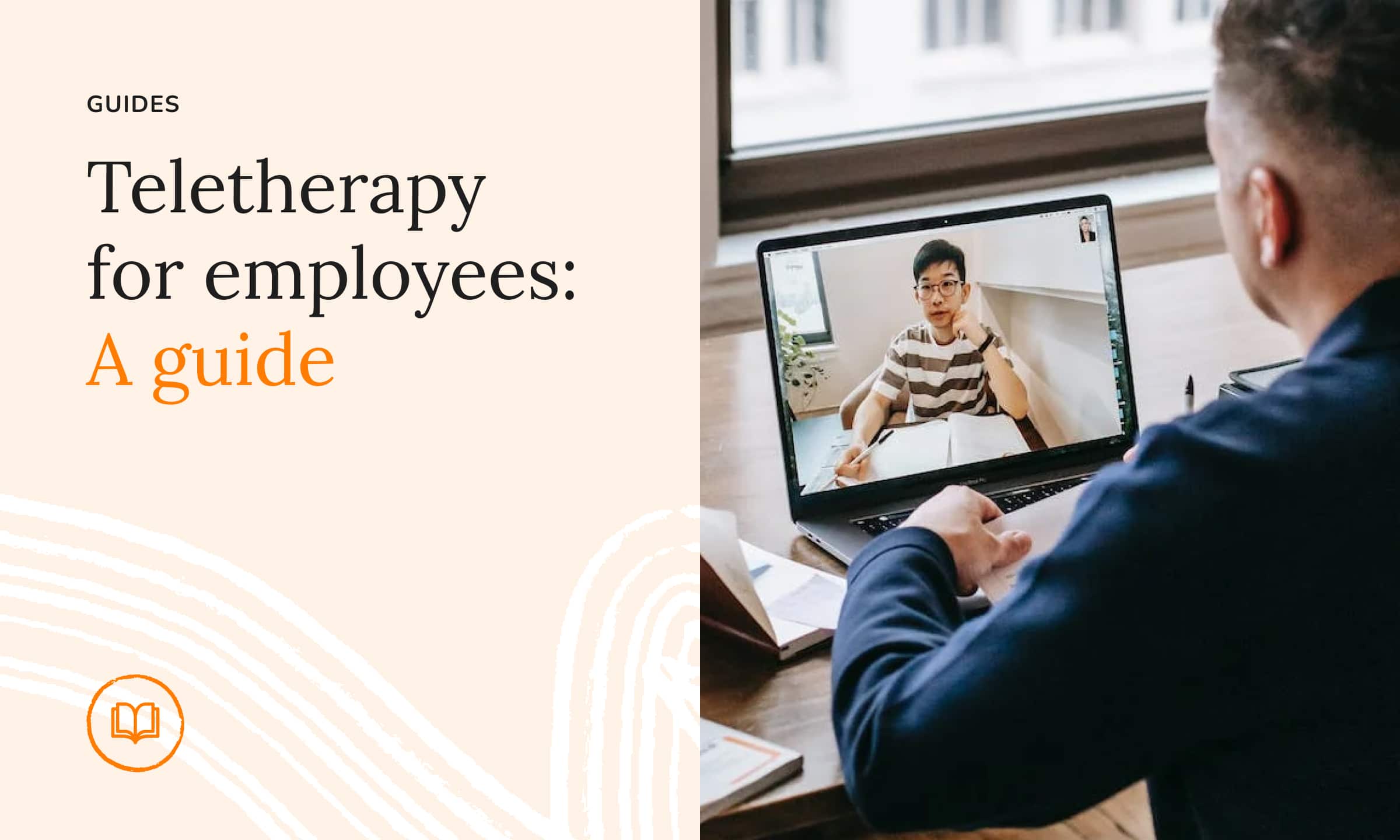Imagine this: You’re feeling overwhelmed by issues at work. Your mood has dipped. You’re struggling to find the energy to get up and work, let alone do anything else. The good news? An expert psychologist is here to help you sort through your headspace and make a plan. And all you have to do is open your laptop. This is the promise of teletherapy!
Teletherapy solves problems of accessibility by making it simple and easy to talk to a psychologist when you need to. And it’s one of the easiest ways to provide mental health support in the workplace, because it can work for your whole team, wherever in the world they are. Let’s get into it!

Teletherapy, also known as online therapy or e-therapy, is becoming increasingly popular for people seeking mental health support. With the rise of remote work, teletherapy has also gained attention as a way to support employees’ mental health needs. In this blog, we will explore the benefits of teletherapy for employees, how companies can provide it, and other options for supporting employee mental health.
What is teletherapy?
Teletherapy is a form of therapy conducted via video conferencing or phone calls. This allows patients to receive therapy from the comfort of their own home, office, or anywhere else with a stable internet connection. Teletherapy can be used for a wide range of mental health concerns, including depression, anxiety, and stress.
A study by the Journal of Clinical Psychiatry found that teletherapy is just as effective as in-person therapy for treating depression and anxiety disorders, while a review of multiple studies published in the Journal of Technology in Behavioral Science found that teletherapy is effective for treating a range of mental health conditions, including depression, anxiety, and PTSD. This makes teletherapy an accessible and effective source of support for anyone seeking mental health care.
The benefits of teletherapy for employees
A range of benefits make teletherapy both significant and appealing for employees. Let’s explore a few:
- Convenience: Employees can schedule appointments that fit into their workday without having to worry about traveling to and from appointments. This saves time and reduces stress, allowing employees to focus on their work without added stress.
- Access: Teletherapy improves access to mental health support for employees who may not have access to traditional in-person therapy, including employees who live in remote areas or who have mobility issues.
- Reduced stigma: Some employees may be hesitant to seek mental health support due to the stigma surrounding mental health. Teletherapy helps to reduce this stigma by providing a more private and discreet environment for therapy.
- Increased Employee Productivity: Employees who receive mental health support through teletherapy may experience an improvement in their mental health, leading to increased productivity and job satisfaction. A study published in the Journal of Occupational Health Psychology found that employees who received mental health treatment had significantly higher job performance ratings than those who did not receive treatment.
How can companies provide therapy for employees?
Want to start and not sure how? Here are a few options:
- Partner with a teletherapy provider: Companies can partner with teletherapy providers, like nilo.health, to offer teletherapy to their employees. This option provides employees with access to licensed therapists, flexible scheduling, and confidential sessions.
- Health Insurance Coverage: Companies can also provide teletherapy coverage as part of their employee health insurance plans. This allows employees to access teletherapy services at little to no cost.
Other options for supporting employee mental health
Teletherapy is just one option in a wide range of actions your company can take to support your employees’ mental health. Here are other actions to consider:
- Flexible Scheduling: Options such as flexible work hours or the ability to work remotely allows employees to prioritize their mental health.
- Mental Health Education: Providing education and resources to employees about mental health has a huge impact on preventative care and destigmatizing mental health as an issue. This can include training on how to recognize signs of mental health concerns and how to seek support.
- Mental Health Days: Providing employees with mental health days as part of their sick leave policy gives employees the time they need to prioritize their mental health without sacrificing their sick leave.
Help us help you
Book a demo today to see how nilo.health provides holistic employee mental health support, including access to teletherapy via our extensively vetted team of leading psychologists. Our nilo.experts are therapists, counselors and psychologists from around the world with specialities in over 200 specialty areas and diverse options for race/ethnicity, LGBTQ+ sensitivity and clinical focus. They speak 35+ languages, catering to your entire team.







